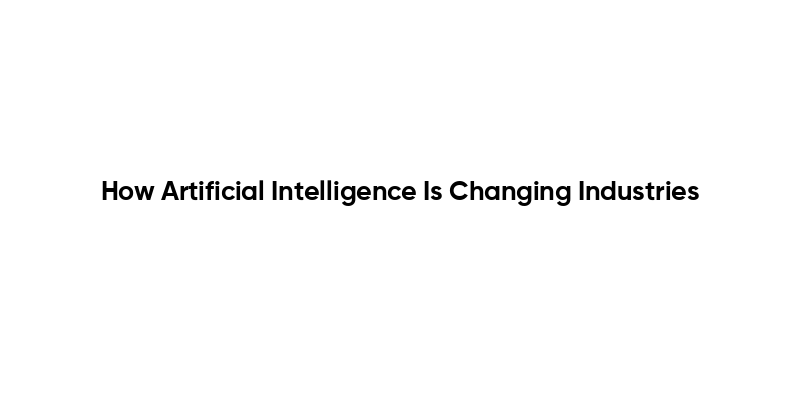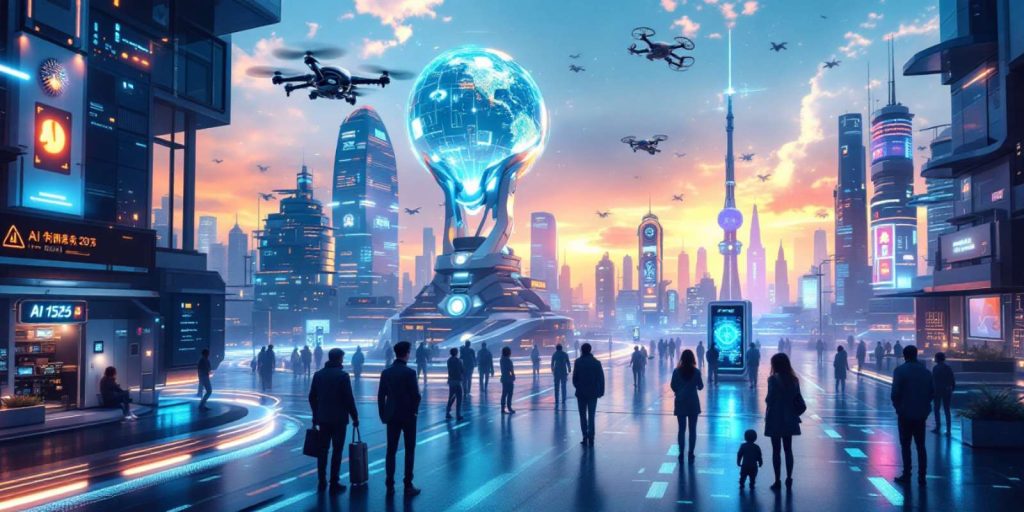Artificial Intelligence (AI) is revolutionizing the way industries operate, bringing forth unprecedented changes that enhance efficiency and drive innovation. From healthcare to finance, AI technologies are reshaping traditional practices, enabling businesses to make data-driven decisions and automate complex processes. As we delve into the impact of AI across various sectors, it becomes clear that this technological advancement is not just a trend but a fundamental shift in how we approach problem-solving and operational efficiency.
In the following sections, we will explore the specific ways in which AI is transforming industries, highlighting real-world applications and success stories. You will learn how AI is improving patient outcomes in healthcare, optimizing supply chains in manufacturing, and personalizing customer experiences in retail. Each example will illustrate the profound implications of AI integration, showcasing its potential to enhance productivity and foster innovation.
Moreover, we will discuss the challenges and ethical considerations that come with the adoption of AI technologies. Understanding these aspects is crucial for businesses looking to implement AI solutions responsibly and effectively. By the end of this article, you will have a comprehensive understanding of how artificial intelligence is changing industries and the future possibilities it holds. So, stay with us as we uncover the transformative power of AI!
AI in Healthcare: Revolutionizing Patient Care
Artificial Intelligence is transforming the healthcare industry by enhancing patient care and streamlining operations. AI algorithms can analyze vast amounts of medical data, enabling healthcare professionals to make more accurate diagnoses and treatment plans. For instance, machine learning models can predict patient outcomes based on historical data, allowing for personalized medicine tailored to individual needs.
Moreover, AI-powered tools such as chatbots and virtual health assistants are improving patient engagement. These technologies provide patients with instant access to information and support, reducing the burden on healthcare providers. As a result, the integration of AI in healthcare not only improves efficiency but also enhances the overall patient experience.
AI in Finance: Enhancing Risk Management
The finance industry is leveraging Artificial Intelligence to enhance risk management and improve decision-making processes. AI systems can analyze market trends and consumer behavior, providing financial institutions with valuable insights. This capability allows banks and investment firms to identify potential risks and opportunities more effectively.
Additionally, AI algorithms are being used for fraud detection. By analyzing transaction patterns, these systems can flag unusual activities in real-time, helping to prevent financial losses. As AI continues to evolve, its role in finance will likely expand, leading to more secure and efficient financial operations.
AI in Retail: Personalizing Customer Experience
In the retail sector, Artificial Intelligence is playing a crucial role in personalizing the customer experience. Retailers are using AI to analyze consumer data and preferences, enabling them to offer tailored recommendations and promotions. This level of personalization not only enhances customer satisfaction but also drives sales and loyalty.
Furthermore, AI-powered inventory management systems help retailers optimize stock levels and reduce waste. By predicting demand based on historical data and market trends, these systems ensure that products are available when customers need them. The integration of AI in retail is reshaping how businesses interact with consumers and manage their operations.
AI in Manufacturing: Streamlining Production Processes
Artificial Intelligence is revolutionizing the manufacturing industry by streamlining production processes and improving efficiency. AI technologies, such as predictive maintenance, allow manufacturers to anticipate equipment failures before they occur, minimizing downtime and reducing costs. This proactive approach to maintenance enhances overall productivity.
Moreover, AI-driven automation is transforming assembly lines. Robots equipped with AI can perform complex tasks with precision and speed, leading to higher quality products and reduced labor costs. As manufacturers continue to adopt AI technologies, the industry is likely to see significant advancements in productivity and innovation.
AI in Transportation: Optimizing Logistics and Safety
The transportation industry is experiencing a significant transformation due to Artificial Intelligence. AI is being used to optimize logistics, improving route planning and reducing fuel consumption. By analyzing traffic patterns and weather conditions, AI systems can suggest the most efficient routes for delivery vehicles, leading to cost savings and faster service.
Additionally, AI is enhancing safety in transportation. Advanced driver-assistance systems (ADAS) utilize AI to monitor driving conditions and provide real-time feedback to drivers. These systems can help prevent accidents and improve overall road safety. As AI technology continues to advance, its impact on transportation will likely grow, leading to safer and more efficient travel.
| Industry | Impact of AI | Examples |
|---|---|---|
| Healthcare | AI is improving diagnostics, personalizing treatment plans, and managing patient data. | AI algorithms for disease detection, robotic surgeries, and virtual health assistants. |
| Finance | AI enhances fraud detection, automates trading, and provides personalized financial advice. | Algorithmic trading systems, credit scoring models, and chatbots for customer service. |
| Retail | AI optimizes inventory management, personalizes shopping experiences, and enhances customer service. | Recommendation engines, automated checkouts, and AI-driven supply chain management. |
| Manufacturing | AI improves production efficiency, predictive maintenance, and quality control. | Robotics in assembly lines, AI for predictive analytics, and smart sensors. |
| Transportation | AI is revolutionizing logistics, enabling autonomous vehicles, and optimizing route planning. | Self-driving cars, AI-based traffic management systems, and delivery drones. |
| Education | AI personalizes learning experiences, automates administrative tasks, and enhances student engagement. | Adaptive learning platforms, AI tutors, and automated grading systems. |
| Entertainment | AI is transforming content creation, recommendation systems, and audience engagement. | AI-generated music and art, streaming service algorithms, and virtual reality experiences. |
This HTML document provides a structured overview of how artificial intelligence is impacting various industries, presented in a clear and informative table format.



